- Home
- Grace Thompson
An Army of Smiles
An Army of Smiles Read online
An Army of Smiles
Table of Contents
Cover
Title Page
Dedication
Foreword
Chapter One
Chapter Two
Chapter Three
Chapter Four
Chapter Five
Chapter Six
Chapter Seven
Chapter Eight
Chapter Nine
Chapter Ten
Chapter Eleven
Chapter Twelve
Chapter Thirteen
Family Pride
Copyright
An Army of Smiles
Grace Thompson
Dedication
I wish to thank the former Naafi men and women who helped me so generously. There are too many to mention by name but I want them to know that their fascinating letters created the background of this book. They taught me so much, made me laugh a lot and sometimes cry. Many facts gleaned from their memories cannot be found in history books, and I am indebted to them. I hold my hand up to any errors that might have crept in but willingly admit that the best of this story is theirs.
Thanks too to the kindness of the sadly missed Sir Harry Secombe, who read the typescript and wrote a foreword.
My sincere and grateful thanks to you all.
Foreword
Grace Thompson has chosen an unusual subject for her latest novel. It is one which has echoes for me. All those of us who served in the last war are extremely grateful for the ladies of the NAAFI. Many a cup of tea tasted all that much sweeter when it was served with a pretty smile – then there weren’t a lot of those in the desert.
The story of three friends, Kate, Rosie and Ethel, it follows their adventures on the home front, in the desert and Italy. Romances, broken promises, the wretchedness of living not knowing whether you’d be alive tomorrow, and snatched moments of warmth during a war that seemed to go on for ever. It’s a rattling good story of love and tragedy – I enjoyed it and I’m sure you will too.
Sir Harry Secombe
Chapter One
Ethel Twomey was happy. She was so filled with joy that she imagined she might burst into flames as she walked beside her soon-to-be fiancé, Wesley. Her dark eyes had glowed as she’d looked up at him, imagining the fun of telling everyone and also, rather shamefully, the relief of being able to leave her miserable home for ever.
Thought of home dulled her excitement. She had managed to put aside the usual feeling of dread as the time to re-enter her house drew near but now, as the road curved to the left and the hotchpotch building, quaintly called The Dell, came into view, the anxieties flooded back. Whenever she had been out, and had been able for a while to forget, the approach to the house caused an increase in fear. ‘One day,’ she regularly told Wesley, ‘one day, I’ll walk in and find my mother knocked out cold and my father still beating her.’
On this special day, when she and Wesley Daniels had agreed on a date for their engagement and their wedding, there was room for nothing else in her mind, just happiness and the thought of leaving home for good. It wasn’t until the turn in the road gave her a first sight of The Dell that her mind returned to the dreadful possibility of walking into the house and facing her father in one of his rages, and the sight of her mother, cowed and utterly defeated, listening to his complaints, real and imaginary.
She was returning from the café where she cooked and occasionally served at table. She reflected that she might be the only one among thousands who actually hated it when her day ended and she had to walk away from the busy café and its sometimes difficult customers.
As she walked on alone through the lanes that early spring evening in 1940 she tried to hold on to the happiness for a while longer. It was dark and blackout restrictions were in force, forbidding any light to be shown, so not even the light from one of the isolated cottages and farmhouses she passed shone out to help her find her way, passing fields where she had run to hide from her father’s rages, and beyond, the Baileys’ farm where she had often worked as a child, helping with the harvest.
She walked over the small footbridge that led to the gate and up the garden path, through the complications of blackout curtaining, and into the house, relieved that at least there was silence, no sound of raised voices. Her father, Dai Twomey, was dozing in his usual chair beside the fire range, dulled with too much food and an excess of drink. His blue eyes, so round and angry, opened and glared at her as he demanded, ‘What time d’you call this?’ before nodding off again. He slept through most of the evening so the meal was a peaceful one.
One evening a few days later, Ethel and Wesley walked through the town, arm in arm and stopping occasionally to kiss. They had been to the pictures and afterwards had peered with difficulty, owing to the unlit displays, through jewellers’ windows to stare again at the engagement ring they planned to buy for her eighteenth birthday a month hence on the eighth of April.
‘We’ll buy it tomorrow,’ Wesley said. ‘In case someone buys it first.’
‘I’ll meet you at three, but I’ll have to go straight back to the café,’ Ethel told him. ‘It’s a pity we can’t have a day out and celebrate.’
‘Tomorrow we’re buying it, we’ll have our celebration on your birthday when I put it on your finger,’ Wesley smiled. ‘What a happy day that’ll be.’
When they climbed on to the bus in town, Ethel’s brother Sid and her sister Glenys called to them from the upper deck, and beckoned for Ethel and Wesley to join them. Sid and Glenys had been to visit friends, young men who had joined the forces and were on leave, determined to enjoy what might be their last visit home for a long time.
‘It started with four of us but others joined in, bent on enjoying their last days at home, and it ended with a sing-song,’ Sid told them as the conductor handed them their tickets.
The sing-song that had ended the evening was revived and was carried on throughout the journey as Ethel and Wesley joined in. Old music hall songs mostly. ‘It’s a Long Way to Tipperary’, ‘Hands, Knees and Bomps-a-Daisy’, ‘Pack Up Your Troubles’, and Ethel’s particular favourite, sung to her by Wesley, ‘Oh, You Beautiful Doll’ – songs that were known to everyone. The other passengers on the bus joined in and even the conductor mouthed a few words.
Ethel was glad they had met up with Sid and Glenys, thankful that she wouldn’t have to make that step into the house on her own and grateful too for the cheerful singing to push aside the fears that would accompany it.
Ethel was much younger than both her sister and her brother. Sid had been fifteen and Glenys sixteen when she had been born, a mistake, her mother often told her, quickly adding that it was one she had never regretted. She envied both Sid and Glenys their lovely auburn hair, inherited no doubt from their father’s angry red.
‘You two make me feel dowdy,’ she complained now, looking at her sister’s blue eyes and those of her brother, so like their father but without the anger.
‘What? You wouldn’t really want this colour?’ Glenys laughed.
Ethel shook her long black hair free from its restraining ribbon as Wesley said proudly, ‘I love your hair, in fact, wouldn’t change a single thing about you, Ethel.’
Shouting goodbye to those left on the bus at the copse called Bagley’s Bank, laughing for no particular reason apart from being happy, they set off down the dark lane, still singing.
Part of the reason for the announcement of her engagement to Wesley was the imminent conscription. Wesley was talking of joining the Naafi, and her brother Sid, at thirty-three, was already working in a factory recently converted to making machine parts for lorries and armoured cars. So far, both Ethel and Glenys were exempt although there were constant requests for women to do their b
it.
As they reached the place where, during daylight hours, the house came into view, she wondered anxiously what her parents’ reaction would be when she told them of her and Wesley’s plans. Oh how the thought of leaving this house excited her. Marrying Wesley and building a home for him to return to was all she dreamed of, and it was only on rare moments she wondered whether it was love for Wesley or the urgent need to leave her family that was the strongest.
When they passed Wesley’s home, a field and a small woodland away from hers, he insisted on walking the rest of the way with her. The singing had stopped, the thin beams of their torches showing the path.
‘If you tell your parents we’re going to marry, I want to be there, just in case your father – you know – gets a bit wild,’ he said.
Flattered by the implied protection he offered, Ethel hugged him and smiled up at him in the darkness.
Sid agreed. ‘He’s less likely to start a fuss if we’re all there,’ he said.
‘Our dad is more of a worry to us than the war,’ Glenys sighed. ‘I keep hoping he’ll grow too old to pick fights, but there he is, sixty years old and in court again last week for attacking the barman for some unintended insult.’
‘Called him a red-headed giant, he did, and for some reason Dad took offence,’ Glenys laughed. ‘But at six foot three and with thick red hair with hardly a hint of grey, what was insulting about that?’
They reached the bend in the road and Ethel clutched her throat as though already hearing her father’s rage. She clung more tightly to Wesley, glad he had decided to see her home.
Inside the back door, the entrance was barricaded with a home-made screen on which black material had been fastened. This prevented the light escaping and presumably, her brother used to joke, would stop a patiently waiting German airman from pin-pointing the area and placing a bomb neatly down their chimney. They all joked about the restrictions after months during which no enemy planes had been seen, but they did as they were instructed for fear of fines.
Dai Twomey was sitting near the fire, wearing corduroys, a torn jumper and in his stockinged feet; his wife in a chair opposite. Molly Twomey stood up and smiled at them but Dai turned his head menacingly and demanded to know why they were so late.
‘We’ve been celebrating, Dad,’ Ethel smiled, going to stand near her mother. ‘Wesley and I are getting engaged on my birthday, before he goes off to war.’
Ethel’s brown eyes looked like dark, secret pools in the light of the oil lamp, her dark hair casting a deep shadow over her face as she waited for her father’s reaction. The anxious expression was hidden, but involuntarily Wesley stepped closer and held her arm protectively.
‘What d’you want me to do about it?’ Dai demanded.
‘Nothing, I suppose. I hoped you might wish us luck.’
‘You’ll need it,’ was the terse reply.
Her mother stood and headed for the kitchen. ‘I’ll make us some cocoa.’
Deflated, yet thankful the evening hadn’t ended in anger and a display of temper, Ethel lay in bed, stared at the old, cracked ceiling and wondered how soon she could get away. The war was a terrible thing, but it did offer the opportunity for freedom where before there had been none. Perhaps she didn’t have to wait until she and Wesley married, next year?
She woke early the following morning and went outside, glad as always to escape from the boxed-in atmosphere of the boarded-up house where no single chink of light was allowed to go out or in. Opening the front door she walked down the path to the road. There was a stream running alongside the gravelled road with its grass edging, and the front path led to a footbridge that spanned it. Now, with the melted snow running down from the hills, the water ran fast and furious, close to the rim.
The stream sparkled as it bounced against stones sticking out where the earth had weakened its hold and been worn away. Did she imagine the hint of a rainbow in its spray?
Every year workmen came and dug out the bed of the stream, maintaining its depth so it didn’t overflow and flood the garden or the road. Today, with the prospect of going into town to buy her engagement ring, ready for the celebration in a few weeks’ time, the stream was beautiful.
As a child she had thought it dull. Too fast for frogs’ spawn, too unpredictable for watercress. Now she admired its fringe of wild flowers. Celandines, spreading the banks with shining gold interspersed by the ubiquitous daisies. Later would come the softer yellow of Welsh poppies and the delicate loveliness of enchanter’s nightshade. Today, for Ethel Twomey, the war was a long way off and the world was perfect.
She went back inside, revived the fire and slid the kettle over the coals to boil for the first cup of tea. As she waited, she looked around the shabby room noting her mother’s attempts to beautify the place with embroidery and a few cheerful cushions. In the silence of the early morning in the sad little room she felt a flood of compassion for both her parents. They worked so hard. Her father worked as a lorry driver, her mother looked after chickens and, during the autumn, also geese and turkeys. Both parents worked in the huge garden, selling their produce to shops and on occasions around the streets, knocking on doors and pushing a handcart laden with their harvest. She suspected that people bought from them out of sympathy for her mother.
Ethel hated working on the land but would sometimes help her mother with some of the tedious jobs outside. At Christmas she kept well out of the way during the killing, and it was her brother Sid who dealt with the preparation of the birds. Her distress was one of the few things that amused her father.
* * *
She waited outside the jewellery shop and watched for Wesley’s arrival. She had been given an hour off. Time to buy the ring and to go to another café and sit for a few minutes admiring it and talking over their dreams and plans. She saw him coming, footsteps fast, hands in pockets, his thin frame wrapped in a coat several sizes too large. She watched him, noting the serious expression, and waited for him to look up and meet her gaze, see the smile open out and transform his solemn face into something quite beautiful. Life, she decided happily, was good.
* * *
Rosie Dreen heard Gran making her slow way down the stairs. As she woke she remembered. Today was her birthday. The day when she had promised herself that everything would change. As she roused herself and rubbed her blue eyes, childlike, with the backs of her hands, she listened to the familiar sounds of her nan busy in the kitchen. Dear Nan. But sentimentality was forbidden from this day on. Today she would do something towards that new life she had promised herself.
She was eighteen and she knew that if she left it much longer she would never get away. Timid, unworldly and lacking in confidence, she was afraid of stepping outside the familiar world of her job at a local farm, and being cared for by Nan. Yet she knew she had to, or spend the most important years of her life in the cocoon she and Nan had built around themselves. She had to get away. And soon, or it would be too late. After a breakfast of porridge she opened the gifts Nan had got for her. Nan stood watching anxiously, afraid her choices would be a disappointment. She had patiently knitted her a pair of gloves and a hat. Hiding her dismay at the unexciting gifts, Rosie hugged her grandmother and told her she considered herself the luckiest of girls. A knitted hat was one of the things she had sworn never again to wear.
She went into town and looked at all the posters asking for women to do something to help the war effort. What could she do? No experience, no skills, nothing to offer. Apart from factory work which she knew she would hate, or the forces, who wouldn’t want someone as stupid as she, what was there? She saw her reflection in a shop window, her smallness more apparent because of the ill-fitting coat she wore, guileless blue eyes, her fair hair scragged back and hidden with the brimmed hat that was much too large and made her look even more stupid than usual.
Why hadn’t she been born glamorous? she wailed inwardly. Perhaps Mam wouldn’t have left me if I’d been born beautiful. Being poor and living with Na
n, neither had helped. She continued to stare at her reflection: a coat that had been cut down in an attempt to make it fit, sensible shoes with the addition of heel studs to make them last, and a brown felt hat that had been Nan’s! She smiled as she remembered buying lipstick and rouge, trying them out, then being too embarrassed to leave her bedroom before washing it all off.
Best she stayed on the farm where she worked as a part-time housekeeper and occasional farm hand. Yet with the war taking men from the farms, she knew that unless she got out quickly she- would never be allowed to leave. What could she do that would take her away from Nan?
She turned to go home when a poster caught her eye. Join the Naafi, she read. Was it possible? She understood that they provided a shop for essentials and prepared cooked meals and snacks for the forces. She’d been cooking simple food for as long as she could remember – perhaps she did have something to offer? Cooking was a skill, of sorts.
She made her way home clutching some leaflets and wondered whether she dare apply. Her love for her grandmother was a part of her reluctance to leave home. Nan would be terribly hurt unless there was a valid reason for her going. Advertisements urging women to do something to help win the war soon became so familiar they faded into unimportance. She doubted if Nan had been aware of them, and knew that even if she had, she would not have considered them relevant.
Rosie wished she dared go into a café alone and order tea, but if she tried, her embarrassment would have her imagining everyone staring at her. ‘I am stupid,’ she muttered angrily, ‘and stupid I’ll remain unless I get out and do something soon.’
Rosie had lived with her grandmother since the age of five. It was her nan who had taken her to school on her first day, and Nan who had helped her through her early struggles to learn to read and cope with adding and subtracting. Nan too who went to the school and sorted out a problem with teasing and bullying and persuaded the teacher that Rosie needed extra attention owing to her sad circumstances.

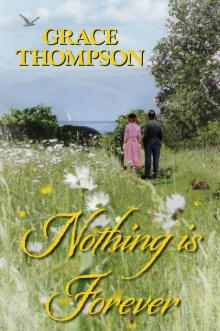 Nothing is Forever
Nothing is Forever Friends and Secrets
Friends and Secrets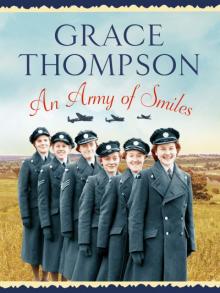 An Army of Smiles
An Army of Smiles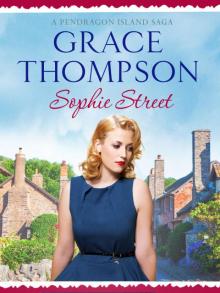 Sophie Street
Sophie Street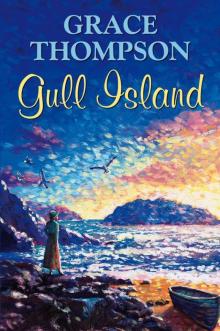 Gull Island
Gull Island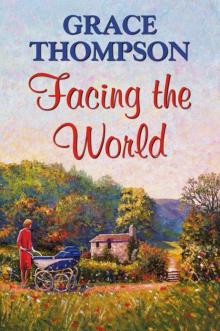 Facing the World
Facing the World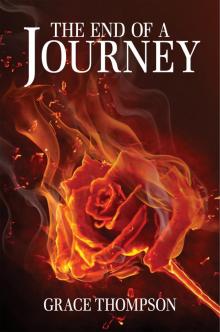 The End of a Journey
The End of a Journey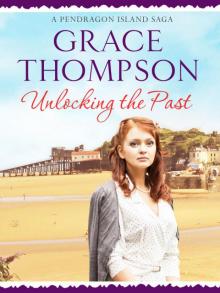 Unlocking the Past
Unlocking the Past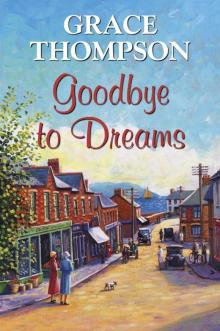 Goodbye to Dreams
Goodbye to Dreams The Weston Girls
The Weston Girls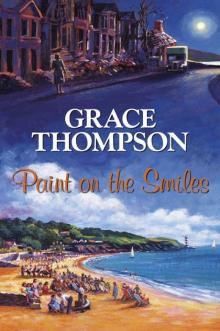 Paint on the Smiles
Paint on the Smiles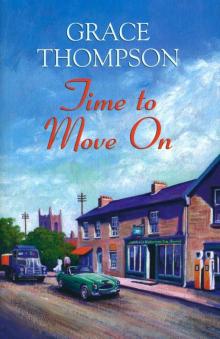 Time to Move On
Time to Move On The Runaway
The Runaway